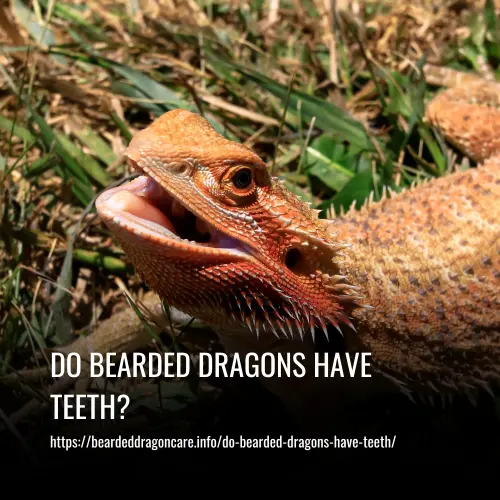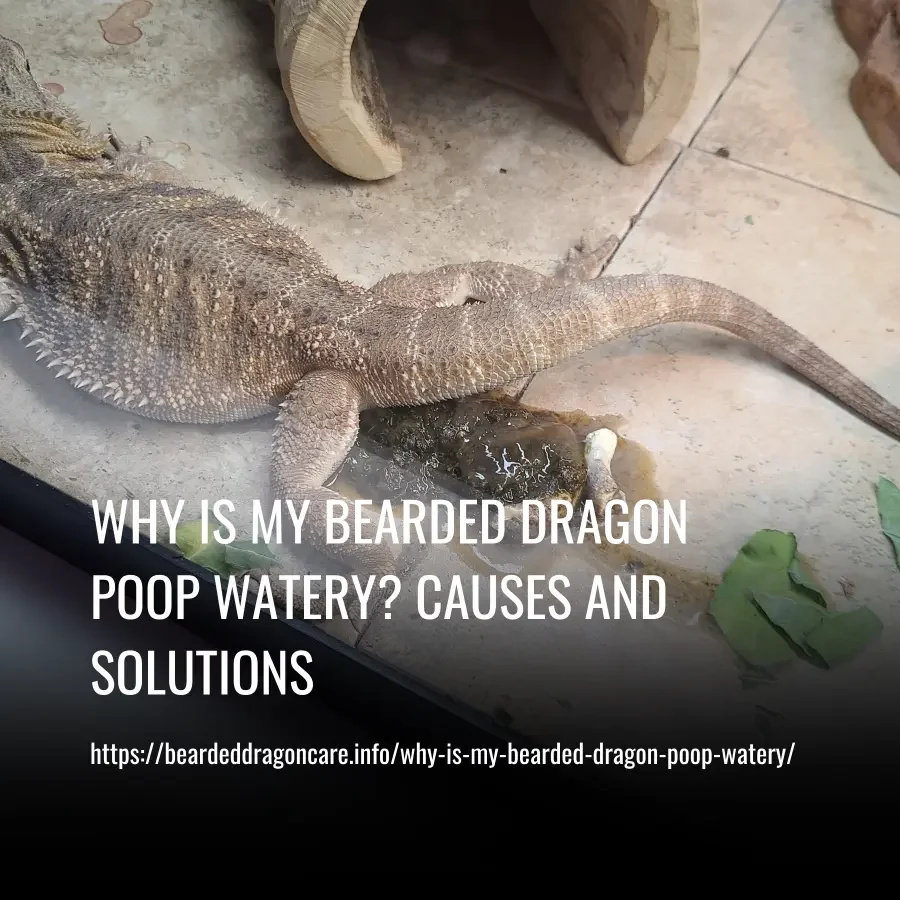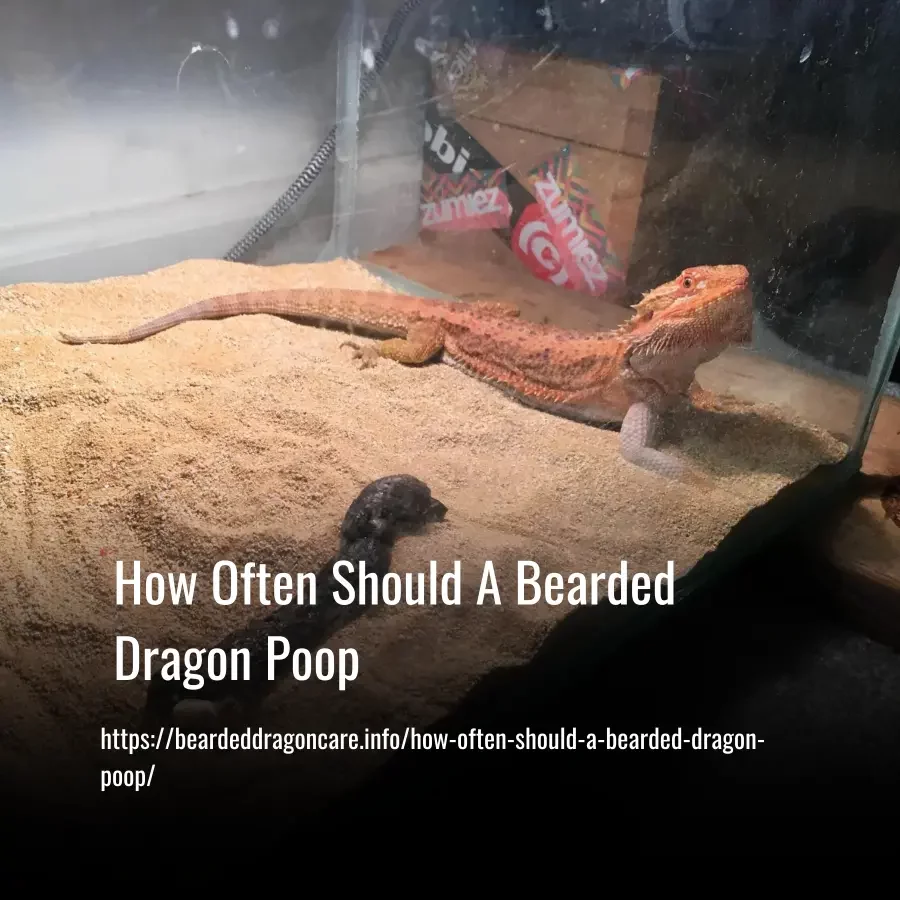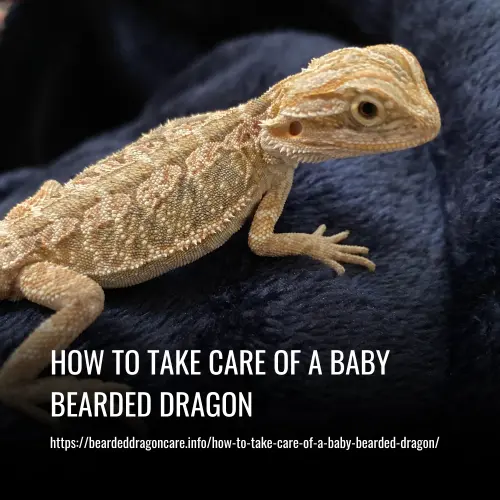Bearded dragons are fascinating creatures that are increasingly popular as pets. They are docile, easy to care for, and have unique physical features. One question that many bearded dragon owners have is whether or not their pets have teeth.
The answer is yes, bearded dragons do have teeth, but they are not like human teeth. Bearded dragon teeth are small and sharp, designed to help them eat their prey. Understanding the dental anatomy of your bearded dragon can help you provide the right diet and care to keep them healthy and happy.

Do Bearded Dragons Have Teeth
Yes, bearded dragons do have teeth, although they may be difficult to see. They can have up to 80 teeth that run in a ‘U’ shape around their jaws, with two different types of teeth on their upper and lower jaws. Each tooth has a hard enamel coating, a dentin body, and a soft pulp core that keeps it alive and supplied with blood and nutrients.
Types of Teeth
Bearded dragon teeth are divided into two types: pleurodont teeth and acrodont teeth. Pleurodont teeth are sharp and located at the front of the mouth, with deep roots fused to the jawbone. They are vital for eating and require proper care.
Acrodont teeth are short and triangle-shaped, located near the back of the mouth, and are essential for chewing. Neglecting acrodont teeth can lead to them falling out, so owners must keep them in good condition.
1. Acrodont Upper Teeth
Bearded dragons have small, flattened teeth in their upper jaws that are difficult to see. These teeth are acrodont, meaning they have no true root or socket and are affixed to the top of the jaw bone. While they function well, they do not regrow once the bearded dragon is fully grown. This means that if an adult bearded dragon breaks or loses an upper tooth, it will be lost forever.
2. Pleurodont Lower Teeth
Bearded dragons have up to 40 teeth in their lower jaw, which are larger than their upper teeth and semi-socketed into the inside edge of the bone. These teeth are called pleurodont and can regrow if broken or lost.
They work with their upper teeth to grip and manipulate prey, which are usually insects or small rodents. The bearded dragon lunges at the prey pull it into its mouth with its tongue and front legs and use its teeth to crunch it up before swallowing.
How Many Teeth Do Bearded Dragons Have
Bearded dragons have between 11 to 17 teeth on their upper jaw and 13 to 20 teeth on their lower jaw. Their teeth are mostly acrodont, which means they are fused to the biting edges of their jawbones.
They also have pleurodont teeth, with 8 teeth in total, 4 on their upper jaw and 4 on their lower jaw. Acrodont teeth are triangular and vary in size.
What Do Bearded Dragons Use Their Teeth For
Bearded dragons use their teeth to cut food into smaller pieces, making it easier to swallow. While baby beardies have sharp teeth, the teeth of adult beardies become less sharp over time due to constant eating.
Bearded dragons are generally calm and do not make frequent noises, but they may squeak or hiss when threatened or unhappy. They may also make noises if they want something.
Bearded Dragon Teeth Problems
Bearded dragons are prone to tooth fractures, infections, and periodontal disease, which can lead to tooth loss if left untreated. Symptoms of periodontal disease include bleeding in the mouth, gingivitis, loss of appetite, and missing teeth.
To prevent tooth problems, feed your beardie a balanced diet and limit stress. Avoid feeding them only soft-bodied insects and housing multiple beardies together. If your bearded dragon exhibits any symptoms, visit a veterinarian for a full oral examination and physical workup.
Causes of Tooth Damage
Tooth damage in dragons can be caused by several factors. Here are four notable causes to keep in mind:
1. Gingivitis
This permanent condition causes a dragon’s teeth to become overexposed due to gum recession. Gingivitis is increasingly common among beardies, but proper teeth cleaning and good diets can help prevent it.
2. Periodontal Disease
Bearded dragons are predisposed to this severe gum infection that can harden teeth and destroy jawbones if left untreated. Owners should take preventative measures to avoid this condition.
Signs of Periodontal Disease
Bearded dragons, especially those in captivity, are prone to periodontal disease which can lead to serious health issues.
Signs of periodontal disease include loss of appetite, lethargy, dehydration, inflammation of the mouth, receding gum line, plaque build-up, bone exposure, discolored or missing teeth, and brown or black teeth. If you notice any of these signs, it’s important to seek medical care from a veterinarian for your bearded dragon.
Treatment of Periodontal Disease
Treatment options for bearded dragon periodontal disease may include professional dental cleaning, diagnostic workup, antibiotics, anti-inflammatories, adjustments to their at-home care, diet, lighting, and/or housing enclosure, and ultrasonic dental scaling under anesthesia.
Long-term management may involve oral exams, brushing the teeth, and follow-up care with dental radiographs and cleanings. Consult with a veterinarian for the best course of treatment for your bearded dragon.
3. Mouth Rot
This serious bacterial infection in the gums can lead to bleeding gums, lack of appetite, missing teeth, and excessive thick mucus. Any pet owner who notices white pus pockets in their beardie’s mouth should contact a vet immediately.
4. Tooth Trauma
Tooth trauma is caused by external sources, such as accidentally hitting the dragon’s teeth or smacking their face when falling from an elevated surface. While it’s the easiest to avoid, owners should still take care to prevent any accidents that could cause tooth damage.
What Can Effect The Health Of Bearded Dragons Teeth
As a Bearded Dragon owner, it’s important to understand the three main factors that can affect your pet’s oral health: diet, lighting, and fighting.
1. Diet
Your Dragon’s teeth can be affected by plaque, which can lead to tartar buildup and dental problems. To prevent this, limit sugary and citrus fruits and instead feed them crunchy insects and vegetables, which can naturally clean their teeth. A balanced diet should consist of 60% protein from insects and 40% vegetation for babies and 80% insects and 20% vegetation for adults.
2. Lighting
Proper UVB lighting is crucial for calcium absorption and overall health. Make sure to set up the correct lighting and basking temperature, as a lack of efficient digestion can lead to inadequate nutrient absorption, including for teeth.
3. Fighting
Bearded Dragons are solitary and territorial animals, so it’s best to avoid keeping more than one in a tank. Fighting for dominance, food, or territory can lead to tooth damage or loss, so it’s important to keep your Dragon in a separate tank if possible.
Methods to Prevent Bearded Dragon Teeth Issues
Maintaining a healthy diet, reducing stress, and proper dental care are essential for the well-being of your bearded dragon.
1. Diet
A balanced diet of both crunchy and soft foods is crucial for your bearded dragon’s health. Include crunchy protein like Dubia Roaches and small cut vegetables in their meals. Avoid feeding them sugary foods and supplement their diet with calcium powder. Proper lighting in their enclosure is also necessary for proper nutrient absorption.
2. Stress
Limiting stress is crucial for your bearded dragon’s dental health. Fighting with another bearded dragon or seeing their reflection in glass can result in tooth damage or loss. It’s important to create a stress-free environment to ensure their well-being.
3. Check their teeth regularly
Look for any notable signs of issues like build-ups during weekly or bi-weekly exams. Address issues quickly with cleaning and seek veterinary care for more severe issues.
4. Cleaning
Regular dental care is essential for your bearded dragon’s health. Clean and inspect their teeth regularly, including during their annual exam with a veterinarian. Proper dental care can prevent dental diseases and ensure their teeth remain healthy.
5. Keep your dragon off high elevated surfaces
Falling off elevated surfaces can lead to gum disease or tooth damage. Keep your dragon on ground surfaces as much as possible to prevent these outcomes.
Can You Clean Bearded Dragon’s Teeth
Yes, you can clean your bearded dragon’s teeth! It’s best to do so gently 1-2 times per week. However, it’s recommended that you have your veterinarian show you how to do it properly to avoid accidentally hurting your pet while trying to brush their teeth.
How to Clean Bearded Dragon Teeth
To clean your bearded dragon’s teeth, use a soaked cotton bud to gently wipe the teeth and gums. You can use water or a diluted chlorhexidine solution to moisten the cotton bud. This should be done once or twice a week to prevent periodontal disease and prolong the bearded dragon’s lifespan.
Chlorhexidine is an antiseptic and disinfectant that can decrease yeast activity, fungus, viruses, and bacteria. However, it’s important to consult with a veterinarian before using this product and ensure you have the right concentration. Additionally, check your bearded dragon’s teeth for any discoloration, inflammation, or broken teeth for their safety and health.
Can Bearded Dragons Lose Their Teeth
Yes, bearded dragons can lose their teeth just like humans and other animals with teeth. They have acrodont dentition, which means their teeth are relatively loosely attached to their jawbone, making them more prone to losing teeth.
What To Do If Your Lizard Loses Their Teeth
If your lizard loses their teeth, the best thing to do is to take them to a veterinarian for a full oral examination and physical workup to ensure their overall health. The vet will be able to assess the situation and provide appropriate treatment.
Do Bearded Dragons Teeth Grow Back
Bearded dragons have unique teeth compared to other animals, and while their front teeth can grow back, their back teeth do not. It’s rare for them to lose their back teeth since they offer more protection. However, if not properly cared for, their teeth can wear down or fall out.
Are Bearded Dragons Teeth Sharp
Bearded dragons’ teeth are sharp, especially in baby and juvenile dragons. However, their teeth become less sharp as they age and their teeth wear down from chewing. A balanced diet is crucial for their oral health, and it’s recommended to feed them more insects and vegetables to aid the natural cleaning of their teeth.
Citrus and sugary fruits should be limited to prevent plaque buildup and tartar. Lighting also plays a significant role in promoting healthy teeth, and a suitable UVB lighting setup is crucial for calcium absorption.
Can Bearded Dragons Bite
Yes, bearded dragons can bite. However, small bearded dragons have small jaws and teeth that can only pinch, while larger ones can draw blood and even require medical attention. Bearded dragons are not aggressive and will only bite as a last resort or if they mistake a finger for food.
Why Bearded Dragon Bite
Bearded dragons can bite for several reasons, including hunger, self-defense, mishandling, untamed behavior, and mating season. Hunger and the smell of food on your hands can make them more likely to bite while mishandling and improper care can also lead to bites. During mating season, they can be territorial and aggressive, so it’s best to give them space.
To avoid getting bitten, feed your pet regularly, handle them properly, and pay attention to their behavior. If you do get bitten, clean the affected area with antiseptic and seek medical attention if necessary.
Does It Hurt if Bearded Dragon Bites You
If a bearded dragon bites you, you’ll likely feel little or no pain. The amount of pain you feel will depend on the size and age of the bearded dragon. Their teeth are serrated, so you may feel a small tingling sensation. However, it’s important to handle them properly to avoid getting bitten in the first place.
Do Baby Bearded Dragons Have Teeth
Yes, baby bearded dragons do have teeth. They need teeth from the moment they hatch in order to chew insects and vegetation. Their teeth are small, sharp, and hard to see at first, but they will become blunter as they grow and continue to feed. Unlike humans, bearded dragons have teeth from birth.
Baby Bearded Dragon Teeth
Baby bearded dragons are born with a full set of teeth because they need to take care of themselves from the moment they hatch. They develop their teeth before they even hatch, so they are ready to hunt and chew their food as soon as they come out of the egg.
Additionally, they have an egg tooth on the tip of their nose that helps them break out of the egg, but it falls off shortly after hatching.
FAQs
Should I Check My Bearded Dragons Teeth?
Yes, it’s a good idea to check your Bearded Dragon’s teeth at least once a month to make sure they’re healthy and not causing any problems. Set a monthly routine to make sure you don’t forget. If you notice any issues, contact your vet for advice. Consider getting reptile insurance to help cover potential vet bills.
Do I Need to Clean My Bearded Dragons Teeth?
Yes, it is a good idea to clean your bearded dragon’s teeth. You can use a cotton bud soaked in water to wipe around their teeth and gums daily to prevent plaque and tartar buildup. The types of food you feed them also affect their dental health. Brushing their teeth may take some time to get used to, but it is worth it for their overall health.
Should I Brush My Bearded Dragon’s Teeth?
Yes, it is recommended to brush your bearded dragon’s teeth to prevent periodontal disease and keep their teeth healthy. Bearded dragons are prone to dental problems, so it’s important to provide them with the right conditions and food to keep their teeth in good condition. Replicating their natural environment in their enclosure is also important for their overall health.
What To Do If My Bearded Dragon Has Black Teeth or Gums?
If your bearded dragon has black teeth or gums, it’s important to take them to the vet right away. Black teeth or gums can be a sign of disease or infection caused by a poor diet or deficiencies. Deficiencies are common in captive bearded dragons, so it’s important to make sure they’re getting the proper nutrients.
How to Open My Bearded Dragon’s Mouth?
To open your bearded dragon’s mouth, gently apply pressure to the sides of its head just above its mouth using your thumb and forefinger. This should cause your beardie to open its mouth so you can clean or inspect its teeth.
Do Bearded Dragon’s Teeth Fall Out?
Bearded dragons don’t naturally lose their teeth, but their acrodont dentition can fall out easily when put under force.
Conclusion
In conclusion, bearded dragons do have teeth, but they are not like the teeth we typically think of. They have small, sharp teeth that are used for grabbing and tearing apart their prey. While they may not be the most intimidating teeth, they are still an important part of a bearded dragon’s anatomy.
So, if you’re considering getting a bearded dragon as a pet, don’t worry about their teeth – they’re not as scary as they may seem!


